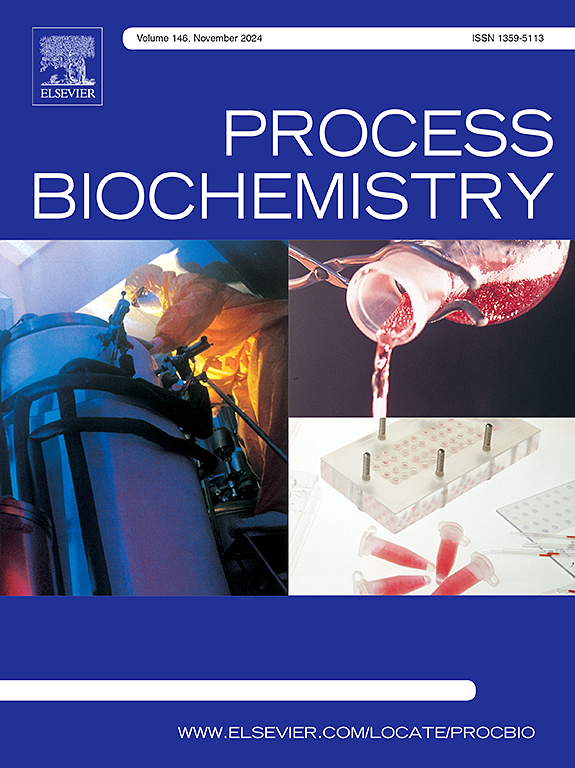Streamlined ultrasonication-assisted lipid extraction and direct transesterification of Rhodosporidium toruloides 1588 single-cell oil
IF 4
3区 生物学
Q2 BIOCHEMISTRY & MOLECULAR BIOLOGY
引用次数: 0
Abstract
Rhodosporidium toruloides-1588 efficiently utilizes various renewable residues for lipid synthesis, that potentially can be used for advanced drop-in biofuel production. However, to improve the feasibility, a streamlined sequential lipid extraction-transesterification process with minimal unit operations is essential. To enhance lipid extraction from R. toruloides-1588 fresh biomass, environmentally friendly solvents in combination with ultrasound-assisted extraction (UAE) were evaluated and compared to the highly used Folch-modified method. The results demonstrated a 291.45 % extraction efficiency in comparison to the reference method using methanol-UAE at the 1:1 ratio (broth removed: solvent added). Subsequent one- or two-step transesterification using KOH and H2SO4 produced fatty acid methyl esters (FAME’s) with a similar distribution to the reference method being oleic, linoleic, palmitic, and stearic fatty acids, the most abundant. Thus, a potentially energy-saving method was developed by removing cell drying and thermochemical hydrolysis steps. Likewise, the proposed method decreases solvent consumption during the ultrasonication-assisted lipid extraction and direct transesterification of R. toruloides-1588 single-cell oil.
流线型超声辅助下红孢子虫1588单细胞油的脂质提取和直接酯交换
环形Rhodosporidium toruloides-1588有效地利用各种可再生残基进行脂质合成,有可能用于先进的drop-in生物燃料生产。然而,为了提高可行性,一个精简的顺序脂质提取-酯交换过程与最小的单元操作是必不可少的。为了提高从新鲜生物质中提取toruloides-1588的油脂,研究了环境友好型溶剂联合超声辅助提取(UAE)的效果,并与常用的folch修饰法进行了比较。结果表明,与甲醇- uae以1:1的比例(除去肉汤:加入溶剂)的参考方法相比,提取效率为291.45 %。随后使用KOH和H2SO4进行一步或两步酯交换反应,生成脂肪酸甲酯(FAME),其分布与参考方法相似,为油酸、亚油酸、棕榈酸和硬脂酸,含量最多。因此,通过去除细胞干燥和热化学水解步骤,开发了一种潜在的节能方法。同样,该方法减少了超声辅助脂质提取和toruloides-1588单细胞油直接酯交换过程中的溶剂消耗。
本文章由计算机程序翻译,如有差异,请以英文原文为准。
求助全文
约1分钟内获得全文
求助全文
来源期刊

Process Biochemistry
生物-工程:化工
CiteScore
8.30
自引率
4.50%
发文量
374
审稿时长
53 days
期刊介绍:
Process Biochemistry is an application-orientated research journal devoted to reporting advances with originality and novelty, in the science and technology of the processes involving bioactive molecules and living organisms. These processes concern the production of useful metabolites or materials, or the removal of toxic compounds using tools and methods of current biology and engineering. Its main areas of interest include novel bioprocesses and enabling technologies (such as nanobiotechnology, tissue engineering, directed evolution, metabolic engineering, systems biology, and synthetic biology) applicable in food (nutraceutical), healthcare (medical, pharmaceutical, cosmetic), energy (biofuels), environmental, and biorefinery industries and their underlying biological and engineering principles.
 求助内容:
求助内容: 应助结果提醒方式:
应助结果提醒方式:


